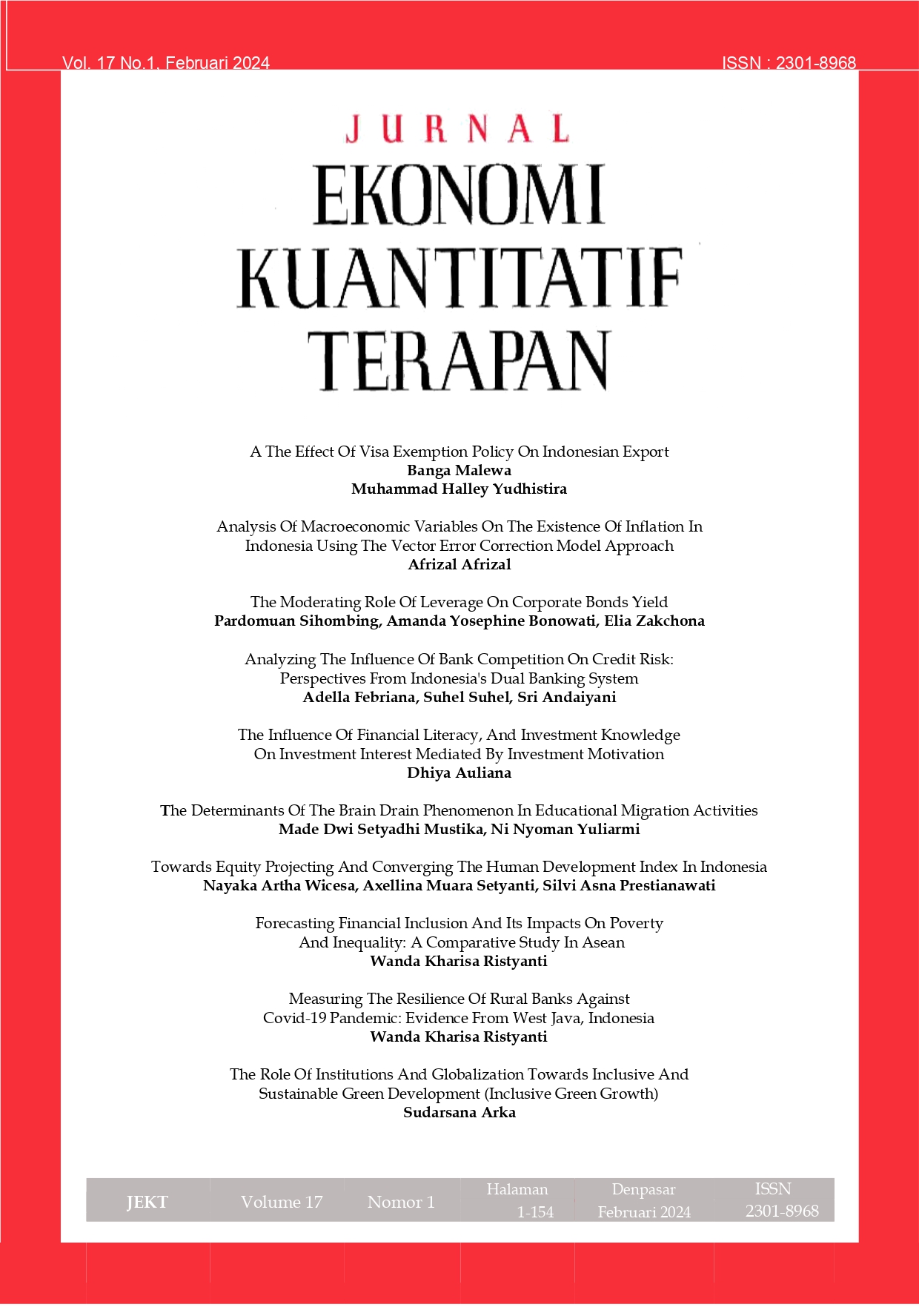The Effect Of Visa Exemption Policy On Indonesian Export
Abstract
This study examines the effect of the visa exemption policy on Indonesia’s exports, by using Staggered Difference in Difference (DID) method and Indonesia's export data to 191 partner countries in 2015 - 2019 period. This study finds that visa exemption policy of Indonesia has effect on its export, but it is not "one size fits all". A significant positive effect was generated by visa-exemption received by American region, and a significant negative effect on exports was generated by visa exemption received by Oceania region. American region is one of the priority recipients of visa exemption policy of Indonesia, and provides the most visa exemption to Indonesia after the Asian region. Meanwhile, Oceania is the most restricted region in terms of visa exemption policy both unilaterally or reciprocally with Indonesia.
Keywords: Visa Exemption, International Trade, Export, Staggered DID
JEL Codes: F13, F16, F22
Downloads
References
Akman, E. (2016b). The facilitating role of visa policies on international trade and foreign direct investment. Turkish Studies, 17(4), 712–732.
ARIC. (2022). Indonesia Free Trade Agreement. Asia Regional Integration Center. https://aric.adb.org/indonesia/data
Asec. (2020). ASEAN Statistical Yearbook 2020. In Jakarta: Association of Southeast Asian Nations (ASEAN) (Vol. 18).
Baltagi, B. . (2005). Econometric Analysis of Panel Data 3rd Edition. In John Wiley and Sons Ltd, England.
Bank Indonesia. (2007). Kerja Sama Perdagangan Internasional: Peluang dan Tantangan Bagi Indonesia (S. Arifin, D. E. Rae, & C. P. R. Joseph (eds.). PT Elex Media Komputindo.
Blanchard, O. (2017). Macroeconomics (2016, Pearson).
BPHN Kemenkumham. (2020). Laporan Akhir Analisis dan Evaluasi Hukum Terkait Keimigrasian.
Cristea, A. D. (2011). Buyer-seller relationships in international trade: Evidence from U.S. States’ exports and business-class travel. Journal of International Economics, 84(2), 207–220.
Czaika, M., & Neumayer, E. (2017). Visa restrictions and economic globalisation. Applied Geography, 84(July), 75–82.
Darma, S. W., & Hastiadi, F. F. (2017). International Journal of Economics and Financial Issues, 7(6), 51–58. http:www.econjournals.com
Fugazza, M. (2004). Export Performance and its Determinants : Supply and Demand Constraints Study Series No . 26. Geneva.UNCTAD.
Goodman-Bacon, A. (2018). `Difference-in-Differences With Variation in Treatment Timing`, NBER Working Paper Series, Working Paper. NBER Working Paper Series, 25018.
Kementerian Perdagangan. (2015). Laporan Akhir Peta Diplomasi Perdagangan Internasional. http://bppp.kemendag.go.id.
Keputusan Presiden Republik Indonesia. (2013). Keputusan Presiden Republik Indonesia Nomor 18 Tahun 2013 Tentang Bebas Visa Kunjungan Singkat (pp. 4–7).
Krugman, P. R., & Obstfeld, M. (2009). International economics: Theory and policy. Boston: Pearson Addison-Wesley.
Limanseto, H. (2022). Surplus Neraca Perdagangan Kembali Cetak Rekor Tertinggi dalam 15 Tahun Terakhir. Www.Ekon.Go.Id.
Nizar, M. A. (2013). Pengaruh Pariwisata Terhadap Perdagangan Internasional di Indonesia. Jurnal Kepariwisataan Indonesia, 8(3 (September)), 227 – 240.
Passport Index. (2022). Passport Index. Passport Index. https://www.passportindex.org/passport/indonesia/
Peraturan Presiden. (2008). Peraturan Presiden Republik Indonesia Nomor 16 Tahun 2008 Tentang Perubahan Kedua Atas Keputusan Presiden Nomor 18 Tahun 2003 Tentang Bebas Visa Kunjungan Singkat (Issue 1, pp. 1–5).
Peraturan Presiden No. 43. (2011). Peraturan Presiden Republik Indonesia Nomor 43 Tahun 2011 Tentang Perubahan Ketiga Atas Keputusan Presiden Nomor 18 Tahun 2003 Tentang Bebas Visa Kunjungan Singkat (Issue 1, pp. 1–4).
Peraturan Presiden Republik Indonesia Nomor 69. (2015). Peraturan Presiden Republik Indonesia Nomor 69 Tahun 2015 Tentang Bebas Visa Kunjungan (Vol. 3, Issue 1).
Peraturan Presiden RI No. 104. (2015). Peraturan Presiden Republik Indonesia Nomor 104 Tahun 2015 Tentang Perubahan Atas Peraturan Presiden Nomor 69 Tahun 2015 Tentang Bebas Visa Kunjungan.
Peraturan Presiden RI No.21. (2016). Peraturan Presiden Republik Indonesia Nomor 21 Tahun 2016 Tentang Bebas Visa Kunjungan.
Prihartini, E. N., & Yudhistira, M. H. (2021). The adverse effects of the visa exemption policy: evidence of immigration violations in Indonesia. Journal of Policy Research in Tourism, Leisure and Events, 0(0), 1–18.
Pudjiastuti, A. Q. (2015). Perubahan Neraca Perdagangan Indonesia Sebagai Akibat Penghapusan Tarif Impor Gula. 3, 106–116.
Supargo, A. (2019). Daftar Negara Bebas Visa dan Visa on Arrival untuk Passpor Indonesia 2019.
Syakir. (2020). Pengaruh Peraturan Presiden Nomor 21 Tahun 2016 Tentang Bebas Visa Terhadap Keamanan Negara dan Kesejahteraan Dalam Perspektif Keimigrasian. Syntax Admiration, 1(3), 262–278.
Trade Map. (2022). List of partners markets for a product commercialized by Indonesia. Trade Map. https://www.trademap.org/
Umana-Dajud, C. (2019). Do visas hinder international trade in goods? Journal of Development Economics, 140(October 2017), 106–126.
Vallejo, D. A. C., & Pescador, J. D. P. (2019). International Business Travel and Trade : A Case Analysis for Colombia.
Yasar Mahmut, L. D., & Avid, R. M. R. (2012). Bilateral trade impacts of temporary foreign visitor policy. 148(3), 501–521.
Yudhistira, M. H., Sofiyandi, Y., Indriyani, W., & Pratama, A. P. (2021). Heterogeneous effects of visa exemption policy on international tourist arrivals: Evidence from Indonesia. Tourism Economics, 27(4), 703–720.




















